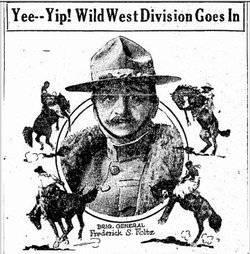Authors:
Historic Era:
Historic Theme:
Subject:
Winter 2019 | Volume 64, Issue 1


Authors:
Historic Era:
Historic Theme:
Subject:
Winter 2019 | Volume 64, Issue 1

The 91st “Wild West” Division was one of nine American divisions that assaulted German positions in the Meuse-Argonne on September 26, 1918. As befitted its name, the 91st was originally assembled from draftees inducted from the Rocky Mountain west. Their first days in action were indeed wild, as they attacked toward the enemy-held village of Gesnes against well-entrenched machine guns. Green though they were, the westerners fought with honor, but paid an ugly price. Among their number was the father of a future Hollywood movie star.
The Assault Begins
91st Division officers in training, 1917. National Archives
First Lieutenant Frank L. Thompson of Montana, serving with the division’s 348th Machine Gun Battalion, encountered a group of enemy prisoners shortly after the attack began on September 26: “We stopped to rest a little, then our eyes popped out,” he later wrote. “Around a corner in the road came a doughboy and behind was what I took to be the German army. Eventually they proved to be only two hundred prisoners, and one officer. Instead of the brutal, bestial murderers of babies and rapers of women we saw a crown of blond blue-eyed boys and studious looking elderly men with spectacles. They were the meekest crowd to be posing as conquerors of the world I ever hope to see.” But he also encountered American wounded at an aid station: “Several men were there with limbs missing—one heavy weight boxer from Los Angeles had a leg off. He was unconscious.”
On September 27, “at dawn, which broke dull and cloudy, the word came to advance. My platoon was told off to support ‘M’ Company of the 363rd Infantry,” Lieutenant Thompson remembered, “so over the hill we started. We had gone about 200 yards when ‘tst-tst-tst-tst!’ and we did an Annette Kellermann [a famous Austrian actress and diving champion] for Mother Earth. I heard a moan from behind and saw a man trying to get up—then he bent over as though to vomit and the blood gushed out in a stream from his mouth.” For two days the attack bogged down.
Farley Granger Conquers Hell
91st Division Field Hospital, 1918. National Archives
Lieutenant Farley Granger of California, father of the future Hollywood star of the same name, served with the 362nd Regiment. On September 29 his outfit was ordered to assault Gesnes, even though, as he recalled, “up to this time the Regiment had fought for three days without hot food or coffee and but little water and cold food.” Casualties had been heavy, and many of the regiment’s officers considered the attack to be “madness.” As Lieutenant Granger watched, “Captain Montgomery remarked he feared such an advance impossible—that our losses would be terrible. Captain Bradbury answered ‘To hell